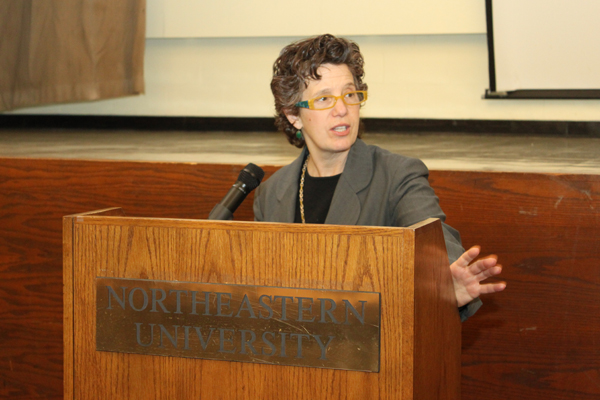3Qs: The tolerance trap

 In her new book The Tolerance Trap: How God, Genes, And Good Intentions Are Sabotaging Gay Equality, Suzanna Walters, a professor of sociology and the director of the Women’s, Gender, and Sexuality Studies program, argues that the plea for tolerance has sabotaged the full integration of gay men and women into American life. Here, Walters, who is currently on tour promoting the book, explains why tolerance stifles—rather than promotes—genuine equality.
In her new book The Tolerance Trap: How God, Genes, And Good Intentions Are Sabotaging Gay Equality, Suzanna Walters, a professor of sociology and the director of the Women’s, Gender, and Sexuality Studies program, argues that the plea for tolerance has sabotaged the full integration of gay men and women into American life. Here, Walters, who is currently on tour promoting the book, explains why tolerance stifles—rather than promotes—genuine equality.
In the book, you liken gay tolerance to a dead end rather than an end goal, writing that “gayness is not a problem to be understood, or solved, or even tolerated.” What are the dangers of merely “tolerating” homosexuality, and how, as you say, does acceptance stifle, rather than promote, deep integration of gay men and women into American life?
Well, tolerance is certainly better than outright hatred! But think about it: We tolerate things we would rather do without, such as an irritating neighbor or a boring meeting that never seems to end. But we rarely speak of tolerating the things we enjoy, like a delicious meal, a vibrant party, a sunny day. Tolerance and acceptance are low bars to set for any social movement; they provide some respite from explicit hatred, but they can leave that hatred intact, asking little of those who do the tolerating and accepting. The project of deep integration implies that all are changed and enhanced by the new inclusion of those formally excluded, while tolerance is a kind of begrudging “acceptance” of something or someone that is presumed to be—at core —unwanted in the first place. And tolerance explicitly allows bigotry to stay in place: You must now, for example, “tolerate” gay marriage in some states, but that doesn’t mean you have to embrace queerness itself. In other words, tolerance is not up to the task of really challenging anti-gay animus.
You challenge the “born this way” story line, noting that sexuality and civil rights is less about genes than ethics. In what ways does linking human rights to scientific theory damage the pursuit of genuine equality?
Oh, there’s so much wrong with it I don’t know where to begin. Of course, a quick glance at history should reveal the dangers of using biological arguments about social identities: The histories of the Holocaust and anti-Semitism, slavery, racism, and misogyny show how arguments about so-called “biological” or “natural” differences have been used to justify both genocide and garden variety discrimination and exclusion. The political dangers of this should be clear—and made more apparent by the fact that no research is really going into searching for a “straight gene.” In other words, homosexuality is already set up as the “problem” to be solved—or, more ominously, cured. But further, civil rights cannot and must not be based on some idea of “compulsion” or immutability. To say, “give us our rights because we are born this way” or “we can’t help ourselves” is such a dangerous contraction of the quest for full equality and belonging. No social movement worth its salt had done this. In addition, it is thin science and a fundamentally flawed way of understanding the rich complexity of human sexuality; while sexuality is a deeply felt part of self it also does, for many of us, change dramatically throughout the course of life and shift in ways both substantive and inconsequential. It is irrelevant to the question of civil rights.
What does genuine equality look like to you?
Well, it surely doesn’t look like this world, where a few rights (marriage, the military), a few gay celebrities and politicians, and a few witty gay sidekicks on TV stand in for robust inclusion. Genuine equality must include of course an end to legal discrimination—and we’re still far from that, not just in marriage equality but in employment as well. We still have not managed to pass ENDA, the employment non-discrimination act. But real social belonging is something different and implies substantive changes in consciousness. For the LGBT movement, this must mean a newly invigorated alliance with struggles against entrenched sexism, racism, and other forms of discrimination and “othering.” Genuine equality depends on keeping alive a utopian vision of gender and sexual freedom, of a joyous celebration of difference that alters the very tenor of our national discourse. Tolerance has nothing to say to that story.





